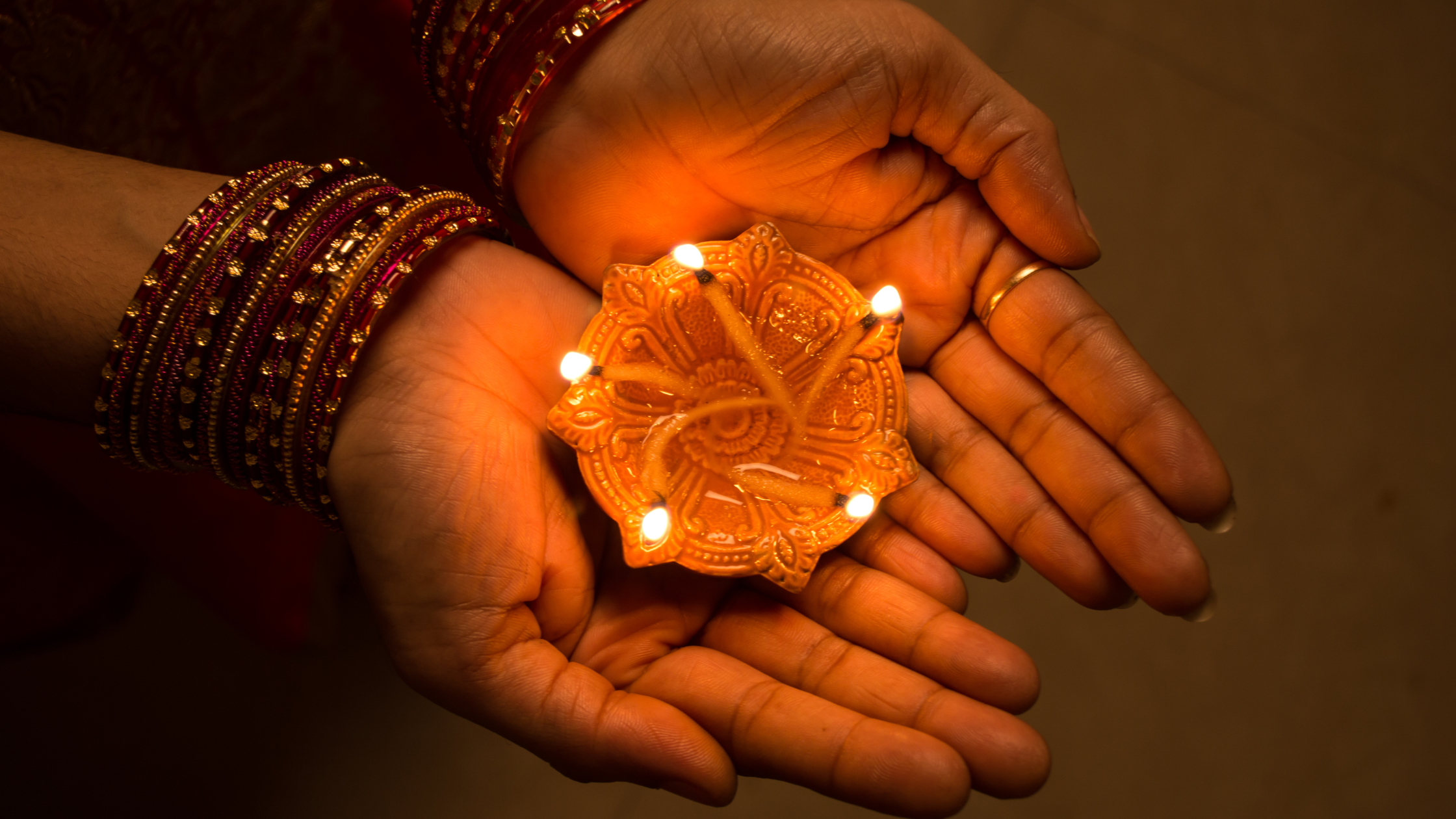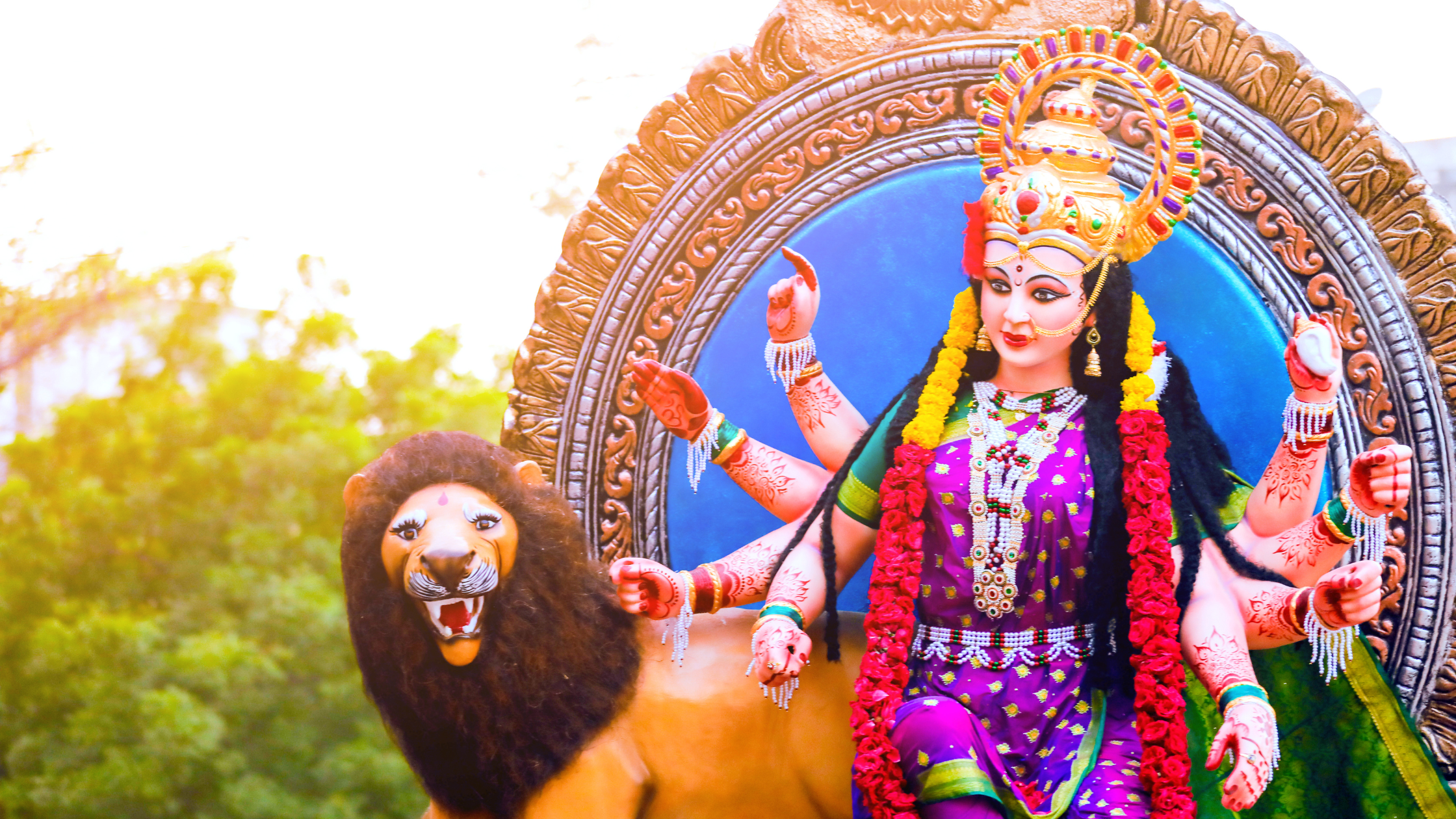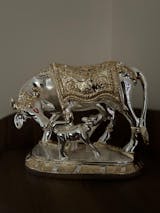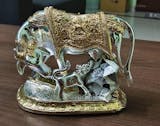Idol worship, also referred to as idolatry or image worship, is man’s way of communicating with God, the Creator, or the Supreme Being. This Universal Consciousness is formless and permeates everything, animate and inanimate. However, the human mind is not engineered to grasp the meaning of the formless and needs to hold on to one form or another for association. The saints and seers of ancient India clearly understood this limitation of the human mind, and they introduced symbols and images for the commoner to understand better. Those unfamiliar with this deep philosophy behind idol worship get bewildered seeing people worshipping stones, rocks, and metals. They may also question the rationale behind Hindus worshipping many gods and goddesses, each with their own idols and images. However, this practice is a reminder that the Absolute formless can take up any form and be present anywhere.
The Hindu philosophy gives us the liberty to create the gods and goddesses of our imagination because whatever is erected in the mind or outside cannot be exclusive or something not of this Universe. Modern science acknowledges that everything in this Universe is made of energy. This energy is not something accidental and haphazardly formed. Rather, this energy is intelligent, provides succour to everything, and is the basis of all existence. We can only marvel at the supreme level of intelligence of the ancient seers and rishis, for they had clearly understood everything about this all-pervasive energy, allowing the human mind to sing its glory in whatever manner, style, and form it pleased.
Swami Vivekananda says all men are born idolaters as they see the universe with its various forms and shapes before them. Everyone loves and takes care of their body, but the body is transient. Hence, man can think of himself and God only through matter, a shape, an idol. The great saint says only the person who realises they are the spirit and not matter and is, therefore, infinite is not an idolater. Swami Vivekananda further says, “When a Hindu worships an idol, the idol reminds him about his beloved deity, and he feels the presence of the deity in the idol,” adding the entire point is about “anubhuti” (feelings and realisation). Hence, the idol is not worshipped as God, but with the anubhuti that God is present in the idol.
Vedanta means the conclusion (anta) of the Vedas and applies to the Upanishads, elaborate treatises on the Vedas. The Vedantic school of thought, as well as Adwaita (non-duality) philosophy, teaches the oneness between the individual soul (Atman) and Brahman (Universal Consciousness). They teach that the greatest temple of God is nowhere but the human heart and exhort us to realise our divine nature. This lesson is the universal truth all major religions teach, and Hinduism is no different. Thus, as we have seen, idol worship is of profound significance in Hinduism. To put it bluntly, it is a means to focus our fickle minds on one particular object. This object cannot be mundane as we are attempting to visualise God; hence, we create something extraordinary and superhuman and start worshipping that creation as a representation of the Divine. After all, it is anubhuti that matters.
History of Idol Worship
Idol worship and its origins can be traced to early humans, who were nature worshippers. They were in awe of the seasons, planetary movements, fire, and water and started worshipping these phenomena. Early humans must also have started worshipping their ancestors after witnessing the death of someone close to them. Having no clue of what happened when a person died, they must have remembered that person in their conversations, thinking that person was still around. This custom of remembering the dead could have stuck on, eventually evolving into ancestral worship.
Nature worship would have been in response to its bountiful quality, evoking feelings of gratitude, respect, and love. Thus, man started worshipping the sun for its warmth, the clouds for their rain, the Earth for its crops, and so on. The human mind perceived in these phenomena its first idols, paving the way for idol worship. It was all about anubhuti—that there is something or someone who is running the show. As time progressed, the human mind, which is rich in its imaginative prowess, began assigning signs and symbols to nature’s myriad forms and thus began the practice of idol worship.
Significance, Importance, and Philosophy of Idol Worship
In the Bhagwad Gita, God or the Supreme Being says it is impossible for embodied beings such as man to worship the one without form. Only the enlightened person with a Godhead can do so, as that enlightened person sees divinity in all things, animate or otherwise. Ordinary people find it easy to focus their minds and thoughts on something tangible or visible, which can be any object made of any material. The object’s size and shape do not matter, but what does matter is the love and devotion that go into that object.
Start treating an inanimate with love and devotion regularly. Soon, you will experience an unseen bond forming between that object and you. This eventually makes you aware of the divinity within you. This is the significance of idol worship as taught by ancient India’s great seers and rishis. These great men and women knew it was challenging to comprehend the formless aspect of the divine. Thus, they assigned an image or symbol for a particular virtue of the Divine, and so was born the Hindu pantheon with thousands of gods and goddesses.
The stories associated with these gods and goddesses are guidelines for leading a virtuous and fulfilling life. Morality and ethics stem from the examples set by these deities, who are looked up to as protectors and guides during challenging times. A Hindu may be observed offering prayers and making offerings to the idol of a particular god or goddess. Still, in reality, the person is propitiating the one divine being, the Godhead, or whatever name we assign to the Creator.
Similarly, there are many reasons for the importance of idol worship in Hinduism. As discussed earlier, God is formless and yet is present in everything we perceive around us. So, it is meaningless to assign a single form to what is omnipresent. We limit God when we say, “God is this or that.” Again, we are defining and limiting our methods of worship when we say, “God should be worshipped only in this or that way.” There is something childlike and innocent when someone bows reverentially before an idol and offers it food and stuff. The love, reverence, and devotion are directed towards what that idol represents. Most of us know that the human body sheds all its old cells every six months and takes on new cells. In other words, a person takes on a new body every six months. We may not realise this, but every time we greet a person we know, we are not greeting the body but the life inside the body. This is what happens in idol worship. Ignorant people see nothing but a lifeless piece of carved stone or wood, but the true devotee knows they are focused on the life form that pervades one and all, including that particular idol.
The importance of idol worship can be summarised as:
- The easiest way to instil faith and devotion in people: Ordinary people find it difficult to comprehend the meaning of a formless God. An idol or image readily helps them to focus their minds on one particular form.
- Acknowledges God’s omniscient and omnipresent nature: God is present in the idol being worshipped, given His omnipresent power.
- The scriptures approve idol worship: The elemental spirit of Hinduism empowers each individual to worship the God of their choice, a direct acknowledgement of His infinite nature. Hence, people can revere and worship the idols they relate to the most.
- Enhances feelings of religiousness: The presence of idols in the house and their regular worship uplifts the human mind, encouraging them to live ethically and uphold morality.
- Helps in concentration and meditation: It is always easy for the human mind to concentrate on something tangible, such as an image or a symbol (yantra). It helps keep the mind focused and under control. Research has proved that meditation helps heal the body of various ailments. Further, science is attesting to the belief that thoughts can manifest reality. Hence, meditation can help heal the mind and body of multiple problems.
- Helps develop feelings of sameness and equanimity: The human body is impermanent. Idols and images, too, are not forever, which teaches us life’s fleeting nature. We learn to be respectful towards others and see our image in them.
- Powerful technique to nurture purity: Idol worship combines the powers of prayer with concentration and meditation. This combination creates a powerful field of sacred energy.
- Transformative and purifying: Idol worship transforms the practitioner as they need to breathe life (prana) into an idol before worshipping it. In other words, the worshipper is breathing life into the worshipped. So, as long as the ritual lasts, the deity remains in the idol. Once the ritual is over and the deity leaves the idol, the prana put in by the worshipper returns in a purified and elevated form.
- Provides balance and tolerance: Idol worship is a suitable alternative for the commoner who may not comprehend the scriptures but wants to worship without priests interfering. Further, the scriptures say balance is vital when treading the path of realisation. For example, a verse from the Isa Upanishad reads thus: “Into blinding darkness enter those who worship ignorance and into still greater darkness those who worship knowledge alone. He who knows knowledge and ignorance together crosses death through ignorance and attains immortal life through knowledge.”
The philosophy of idol worship lies in the fact that the devotee pours their love into the idol as they feel the presence of God in it. An idol is a springboard for the devotee to grasp the Infinite because the human mind cannot understand the formless. Idol worship also helps in steadying the mind. Omnipotence, omniscience, omnipresence, perfection, and truth are words used to describe the divine, which would be too complex for the ordinary man to understand. The philosophy of idol worship is, therefore, to make it easy for everyone to worship the intangible, the formless. A symbol or idol is a prop for the mind to lean on. Initially, it is an external aid to bring the mind to focus on one thing. A person who asserts they can mentally focus on the formless is not speaking the truth. However intellectual a person may be, the mind generates a form by default and dwells on that form. How correct Swami Vivekananda was indeed when he said all men are idolaters!
Significance of Keeping Some Idols at Home
The Hindi pantheon comprises thousands of gods and goddesses, each vested with divine and unique powers. For the uninitiated, they are all subjects of ridicule and superstition, but the true seeker sees in each one the manifestation of the Absolute, the Infinite, the Supreme Godhead. Let’s explore some manifestations of the divine—idols that are popular among the intellectual and the common man.
Ganesh idol: The most adorable of all Hindu deities, Lord Ganesh is the epitome of wisdom, wealth, prosperity, success, and happiness. He is the son of Lord Shiva and Parvati Mata. He has an elephant’s head, as Lord Shiva accidentally cut off his son’s head in a fit of rage. Lord Ganesh is known by as many as 108 names describing his virtues. He is the first deity to be worshipped on any religious occasion as he is the dispeller of darkness and obstacles. The elephant’s head alludes to his immense wisdom. Lord Ganesh is depicted mounted on a mouse, symbolising desire. The lesson to be learnt here is that man should limit his desires. The correct placement of Lord Ganesha’s idol at home brings health, wealth, success, and inner peace. Moreover, as he is the first deity who is worshipped before the start of any new venture, keeping a Ganesh idol at home or in your workplace is only logical as all obstacles will disappear in his presence.
Durga idol: Goddess Durga is a powerful representation of the divine in the feminine form. As the consort of Lord Shiva, she is known as Parvati Mata. The Trinity of Brahma, Vishnu, and Shiva converged their powers to create Goddess Durga. Her mission was to vanquish the buffalo demon Mahishasura, who had become so arrogant and powerful that he had started threatening the gods and humanity with annihilation. Goddess Durga defeated Mahishasura in a battle that lasted for nine days and nights to emerge victorious on the tenth day. This victory of the Goddess is celebrated as Vijayadasami every year during autumn. Goddess Durga symbolises power, courage, and strength, and keeping her idol at home is the surest way of receiving her blessings. The entire household gets blessed with good luck, confidence, and prosperity when you keep a Durga idol in your puja room.
Ganesh Lakshmi idol: The divine as a feminine power is Goddess Lakshmi, the best owner of wealth and prosperity. Every Hindu household has the Ganesh Lakshmi idol in the puja room, representing success and prosperity, respectively. Lord Ganesh is the God of wisdom, and without him, all the wealth showered by Goddess Lakshmi would disappear as wealth goes to waste in unwise hands. Most business places also keep the Ganesh Lakshmi idol for success and wealth. The two deities are worshipped with devotion during Diwali, the festival of lights. Therefore, while Goddess Lakshmi blesses your home or business with wealth and prosperity, Lord Ganesh supplements that with success, intelligence, and by removing all obstacles. Keeping a Ganesh Lakshmi idol is thus a wise investment.
Hanuman idol: Lord Hanuman is the monkey god who single-handedly defeated the forces of Ravana, the powerful king of Lanka. His single-pointed devotion to Lord Ram has earned him an eternal place in the hearts of millions of devotees. Lord Hanuman is a “Chiranjeevi” or an immortal and will remain on Earth till the end of the Kali Yug. He is the spiritual son of the wind god and is also called Vayuputra. Lord Hanuman possesses infinite strength and is also worshipped as the remover of obstacles. The Bajrang Bali or Hanuman idol is considered auspicious and kept at home, at the workplace, and on vehicle dashboards. A home that has an idol of Lord Hanuman remains protected from negative energy and challenges, it is believed. The idol or image should be placed at the front door of your home.
Krishna idol: Lord Krishna is the avatar of Lord Vishnu, who walked on Earth in human form during the Treta Yug. He is the God of protection, compassion, tenderness, and love and is among the most popular deities in Hinduism. He is mainly depicted playing the flute, and accounts of his childhood, full of playful mischief, are a treat to the ears. Lord Krishna is the eternal charioteer or the guide who expounded the Bhagavad Gita to Arjuna during the Kurukshetra war. Also called the Song of God, the Gita teaches mankind the need to fulfil one’s duty without expecting the fruit, the immortality of the soul, and how to escape from the cycle of birth and death and attain liberation. The Krishna idol is usually accompanied by that of Radha, symbolising love, affection, friendship, peace, and compassion. Hence, keeping a Radha Krishna idol at home removes obstacles and provides you with the inner strength to face all adversities. It also welcomes prosperity, harmony, and happiness into our lives.
Laxmi idol: As we have already seen, Goddess Laxmi is the best owner of wealth, fortune, prosperity, power, beauty, and fertility and always finds a place in puja altars at homes and offices. She and Goddesses Durga and Saraswati (the Goddess of learning) form the feminine Tridevi in Hinduism. Goddess Laxmi is the consort of Lord Vishnu. She is depicted with four hands, representing dharma (righteousness), kama (desire), artha (wealth), and moksha (liberation). You can place a Goddess Laxmi idol in the puja room, entrance, or living room of your home. She will bless you with abundance, money, and success in life.
The good news is that you can procure all these idols from Idolkart.com right at your home with just a few clicks of your device! Remember, procrastinating is not a good habit. Get into the act right away!
The Eternal Way of Life
Hinduism is better known as Sanatana Dharma, the eternal or absolute set of duties or religiously ordained practices that must be executed by all Hindus, regardless of caste, creed, or sect. It is a way of life more than a religion and is said to have no beginning or end. Thus, unlike other religions, which an individual or individuals established, Sanatana Dharma is believed to have always existed and will continue to exist forever.
Sanatana Dharma teaches the individual to become a seeker of truth and not a blind follower. The various philosophies that have sprung up over the centuries in India all have one goal—realising the divine nature of the self. Idol worship is only a means to train the fickle mind to focus on a single point. If focusing on a particular object is practised regularly, the mind can grasp subtler truths and be calmer, for the spiritual destination is not someplace far away but within ourselves.
To realise this, we must master our senses and rise above the mind and even the intellect eventually. Idol worship is a prop for the layman; it initiates the uninitiated into taking the leap of faith to the lap of the Absolute, which is the birthright of every human being.





